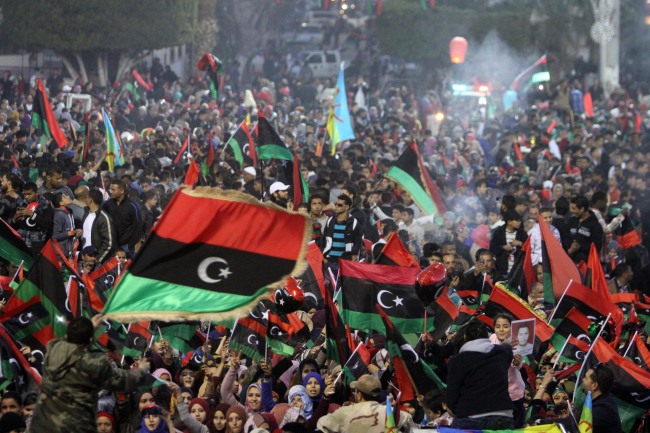 |
People gather to enjoy the fireworks during a celebration for the second anniversary of the Libyan uprising at the Martyrs’ Square in Tripoli on Sunday. ( Xinhua-Yonhap News) |
BENGHAZI, Libya (AP) ― Libya’s leader called on Sunday for unity in the North African nation as it celebrates the second anniversary of the uprising that toppled longtime dictator Moammar Gadhafi but plunged the country into lawlessness and economic woes.
Addressing thousands of flag-waving Libyans in Benghazi, the eastern Libyan city that was the birthplace of the anti-Gadhafi uprising, Mohammed el-Megarif urged his countrymen to “join ranks and resolve our differences to build our nation.”
He also promised to fight poverty and “marginalization,” and to give Libyans extra cash to mark the occasion. He did not say how much money he meant, or how it would be distributed.
Libya has been roiled by instability and violence since the ouster of the Gadhafi regime in late 2011. Benghazi has been among the worst-hit parts of the country, falling prey to armed militiamen and Muslim militants.
El-Megarif alluded to the rise of radical Islam in the energy-rich nation, vowing that he would not allow Libya to become “an incubator of terrorism and violence.”
In what appeared to be an attempt to assuage the militants, the Libyan leader promised that the nation’s next constitution would explicitly declare Islam as the country’s religion and that Islamic law, or Shariah, would be the main source of legislation.
He also vowed to push for laws that would “isolate” remnants of the old Gadhafi regime, another bid to appease militants who claim that members of the ousted regime remained in charge of many government departments as well as the security forces.
Sunday’s celebration was held amid tight security precautions. Army vehicles blocked roads leading to the site and snipers deployed on nearby rooftops.
Underlining the depth of resentment in Benghazi toward the central government in the capital, Tripoli, several youths among the crowd interrupted el-Megarif’s speech with hostile chants.
In Tripoli, tens of thousands thronged the main square in celebration. Security was deployed but the mood was relaxed, as people used fireworks, sent balloons in the sky and sprayed each other with perfume and incense.
Overhead, jets circled in formation.
Salma Bashir, a housewife in her forties, brought her two daughters to the square to celebrate. “I never thought I would see this many people out celebrating. Not even in Gadhafi’s days could they organize such a huge celebration,” she said, as loudspeakers blasted patriotic songs. “This is an expression of our sense of ease. Security has exceeded our expectations.”






![[Exclusive] Hyundai Mobis eyes closer ties with BYD](http://res.heraldm.com/phpwas/restmb_idxmake.php?idx=644&simg=/content/image/2024/11/25/20241125050044_0.jpg)
![[Herald Interview] 'Trump will use tariffs as first line of defense for American manufacturing'](http://res.heraldm.com/phpwas/restmb_idxmake.php?idx=644&simg=/content/image/2024/11/26/20241126050017_0.jpg)
![[Herald Review] 'Gangnam B-Side' combines social realism with masterful suspense, performance](http://res.heraldm.com/phpwas/restmb_idxmake.php?idx=644&simg=/content/image/2024/11/25/20241125050072_0.jpg)